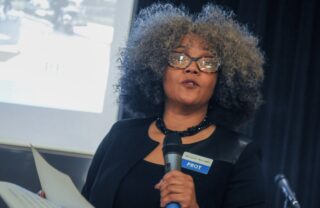“At this juncture, either we will all be comfortable, or we’ll all be uncomfortable.”
— Millicent Williams, Deputy Director of PBOT
On June 17th, the Portland City Council made Juneteenth (June 19th) an annual “Day of Remembrance” and paid holiday. Portland Bureau of Transportation Deputy Director Millicent Williams was one of a slate of people invited to speak about what the holiday means.
Here’s what she said:
“Good afternoon. My name is Millicent Williams… I work in spaces where I know that my presence voice, access and expertise is unexpected, thought to be undeserved and often considered to be a threat. I’ve worked across the full spectrum of public service and now I work in transportation, a discipline that has for many represented a sense of freedom, but for Black people has been a source of pain.
A Black man, Garrett A Morgan, created the three-position traffic signal. Another Black man, Andrew Beard, invented the automatic railroad car coupler. And another Black man, Benjamin Banneker — a cartographer, mathematician and astronomer — was able to redesign Washington D.C. with its signature circles to solve the problems left by Pierre L’Enfant in his original botched design of the city.
Even though these Black men were planners, engineers and innovators; whose inventions changed the world as we know it, they were yet not able to ride in a shared coach, hail a car, or get a seat on a train.
My mother, who grew up in rural North Carolina recently told me of an incident that occurred when she was a young girl walking down a dirt road returning to her family’s home from the general store. As she walked she could hear the roar of a large tractor coming from behind. As the tractor approached she kept inching away from the edge of the road, but the driver kept edging closer — so close that the giant tire of the tractor clipped her shoulder, throwing her to the ground. She remembers the face and laughter of the driver as he drove away. She remembers telling my grandparents about the incident and the anger and fear that my grandfather felt because he knew if he said anything, the outcome for his family would have been disastrous. He remembered and was taught that sometimes, silence meant safety.
I think about how a Black person was supposed to avert their eyes and step aside when they saw a white person on the sidewalk because silence meant safety. I think about redlining, road conditions, dissection and displacement in cities across America and a resultant forced silence which for some, if you weren’t subject to those things, meant safety.
Today I think about those examples and so many other things as we engage in solutions for communities across the city in managing the right-of-way and building infrastructure. As transportation professionals, it’s time for us to think differently about the industry, what it represents, and how we can influence the future.
At this juncture, either we will all be comfortable, or we’ll all be uncomfortable.
The Portland Bureau of Transportation realizes that it can and should do more to address the longstanding transportation-related disparities found in the Black community. Under the leadership of our director Chris Warner and in cooperation with the bureau’s Equity Manager Irene Marion and our Transportation Justice Committee, we will be engaging with intention around four areas of emphasis:
- workforce support and accountability, which includes the recruitment hiring and dev and promotion of Black talent;
- transportation policy and planning intervention;
- supporting and empowering Black Portland;
- and re-imagining the right-of-way using a racial equity framework.
On behalf of the Black girls, boys, men and women of Portland who have suffered pain, loss, violence and dispossession on city streets and sidewalks. On behalf of the little girl who was attacked on the road and who yet persevered to become an educator, author, orator and historian, who taught about the fight for freedom that took place on Harriet Tubman’s Underground Railroad — which as an editorial note, should be considered one of the most comprehensive and sophisticated interstate transportation systems this world has ever known — and who always taught us to revere the legacy and celebrate the importance of June 19th. I, we, say thank you.
And now, the hard work of change begins.”
Williams’ words came about a week after PBOT Director Chris Warner vowed to make the agency more inclusive and anti-racist.
As we continue to hold racial justice and policing issues front-of-mind, we’ll be watching PBOT closely to make sure their actions match their words.
— Jonathan Maus: (503) 706-8804, @jonathan_maus on Twitter and jonathan@bikeportland.org
— Get our headlines delivered to your inbox.
— Support this independent community media outlet with a one-time contribution or monthly subscription.

